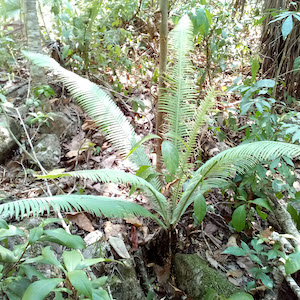 Smart Citations
Smart CitationsSee how this article has been cited at scite.ai
scite shows how a scientific paper has been cited by providing the context of the citation, a classification describing whether it supports, mentions, or contrasts the cited claim, and a label indicating in which section the citation was made.
Dispersal of Dioon edule cycad seeds by rodents in a tropical oak forest in Mexico
Predation of seeds of the cycad Dioon edule Lindl. by Peromyscus mexicanus (Saussure, 1860) has been previously documented, demonstrating that the seeds’ toxins are not harmful when combined with a varied diet. However, there is scarce evidence of P. mexicanus as a seed disperser. In a tropical oak forest in San Luis Potosí, Mexico, we experimented with seeds of D. edule and Quercus polymorpha Schltdl. and Cham., evaluating predators’ preference and recording it with photo-trapping. Burrows were sampled in concentric circles around a D. edule mother plant, and the types of burrows and condition of the seeds inside were identified with a borescope without destroying the burrows. The structure and composition of the forest were evaluated. The primary dispersion of D. edule seeds is by barochory. The rodents predate on seeds and prefer Q. polymorpha over D. edule (survival: 48.9% and 78.5%, respectively). There are more escape and multiple burrows at 3–6 m with mature oaks. Rodents forget or abandon D. edule seeds in the burrows, and such seeds germinate at 3–6 m. Peromyscus leucopus (Rafinesque, 1818) is a short-distance secondary disperser and predator of Dioon edule seeds.
Supporting Agencies
Universidad Autónoma de San Luis PotosíHow to Cite
PAGEPress has chosen to apply the Creative Commons Attribution NonCommercial 4.0 International License (CC BY-NC 4.0) to all manuscripts to be published.








